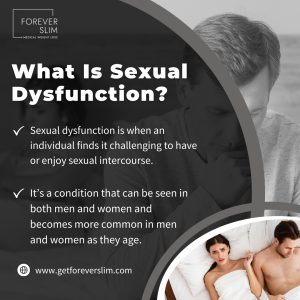
What are the characteristics of a sexually healthy person?
You will see specific attributes in a person that tell you that such a person is sexually healthy. The essential characteristics of a sexually healthy individual include:
- Can talk comfortably about sexual health with health professionals, partners, friends, family, and loved ones.
- Can make decisions about sexual health that align with their identities, goals, values, and beliefs.
- Accept refusals of sex without any feeling of hostility or feeling personally insulted.
- Has the skills and motivation to disclose a present infection, if there’s any, to their sex partners.
- Can be sexually intimate without being physical (for example, talking about sexual feelings, verbally expressing attraction, and doing things that awaken desire in their partner).
- Enjoy sexual feelings without necessarily acting upon the emotions inappropriately.
What is sexual dysfunction?

When an individual has problems with sex, health professionals term it “sexual dysfunction.” Sexual dysfunction is when an individual finds it challenging to have or enjoy sexual intercourse. It’s a condition that can be seen in both men and women and becomes more common in men and women as they age. Stress, illness, medicines, or emotional problems can also affect normal sexual functioning.
Sexual dysfunction may be treated as a minor issue if it lasts for a short period. However, you need to consult your doctor if it lasts longer than a few months. Inform your physician when the dysfunction starts interfering with your relationship with your partner. Sexual dysfunction isn’t a condition you necessarily have to live with; it can be treated. Reach out to your doctor for a proper diagnosis, possible causes, and treatments for the disease.
Which types of sexual dysfunction affect males?
The types of sexual dysfunction that affect males include:
Erectile dysfunction
Erectile dysfunction (ED) is one of the most typical types of sexual dysfunction affecting males. It’s a recurring sexual problem associated with achieving or maintaining an erection enough for sexual intercourse. A person may have ED if they cannot achieve an erection or if they can achieve an erection, but it does not last long enough to have sexual intercourse.
Premature ejaculation
Premature ejaculation (PE) is another sexual dysfunction found in males. Males with PE tend to ejaculate earlier than normal during sex. Premature ejaculation is also known as premature climax, early ejaculation, or rapid ejaculation. PE may be a result of low levels of serotonin in the brain, depression, stress, anxiety about sexual performance, lack of confidence, relationship issues, or aging.
Low libido
Low libido is a persistent lack of interest in sex or lack of sexual desire. It is usual for sexual desire to increase and decrease throughout a person’s life, depending on hormones, age, and mental health. However, when low libido starts affecting one’s relationship, such people may consider it a problem. Low libido may be a result of health conditions such as an underactive thyroid, low testosterone levels, depression, stress, or certain medications.
What causes sexual dysfunction in males?
Sexual dysfunction causes psychological or physical conditions resulting in the dysfunction. Some of the conditions that can cause sexual dysfunction in males include:
- Diabetes
- Hypertension
- Dyslipidemia
- Parkinson’s disease
- Hormone disorders such as testosterone deficiency
- Multiple Sclerosis
- Surgical complications
- Smoking
- Alcohol use disorder
- Obesity
- Substance abuse, such as cocaine use
Medications that can cause erectile dysfunction include:
- Opioid painkillers
- Anti-hypertensives
- Heart medications such as digoxin
- Antidepressants, including monoamine oxidase inhibitors, selective serotonin reuptake inhibitors, and tricyclic antidepressants
- Some cancer drugs, including chemotherapeutic agents
- Anticholinergics
- Hormone drugs
- Anti-anxiety medications
Psychological factors that can cause sexual dysfunction in males include:
- Anxiety
- Depression
- Fear of intimacy
Facts All Men Should Know About Sexual Problems
- Having a healthy lifestyle reflects on your sexual health. You are less likely to suffer from sexual dysfunction if your overall health is good. Cardiovascular disease, metabolic issues, or mental health issues usually cause sexual problems. Therefore, living a healthy lifestyle and taking care of yourself can help you prevent many of the sexual dysfunction problems.
- Consult only qualified health professionals for any sexual dysfunction problems. You would find a lot of posts on the internet of various sexual health specialists claiming to provide adequate treatment for any and every kind of sexual problem. In most cases, they’re usually quacks and can’t offer the best treatment for your condition. Consulting them is putting your sexual health and life at risk.
- Cardiovascular disease can be the cause of a sexual problem. Some types of sexual dysfunction, for instance, erectile function, depend on the blood flow, which reaches the penile tissue and triggers an erection. Cardiovascular diseases can cause blood vessels vessel damage, which can lead to insufficient blood flow and impaired erections.
- Mental health plays a crucial role in sexual health and dysfunction. Sexual dysfunction may be seen in both younger and older men, and mental health is a primary reason for most of the dysfunction in younger men. For instance, performance anxiety is a common cause of erectile dysfunction, stress may lead to premature ejaculation, and depression reduces sexual desire and may cause a sexual arousal problem.
- Treatment is not mandatory in all cases of sexual dysfunction. One of the common misconceptions about sexual health problems is that they require intense treatment, and this isn’t so. The need for treatment will depend on the cause of the dysfunction, so for sexual dysfunction caused by psychological factors, counseling is usually enough as treatment.
Preventing Male Sexual Health Problems

While some types of sexual dysfunction cannot be prevented, others can. Generally, you can minimize your risk of certain types of sexual dysfunction by working to prevent yourself from the causes of the dysfunction.
Adopt the following tips to avoid male sexual dysfunction:
- Actively take steps to treat chronic diseases like heart disease or diabetes if you’ve any to improve your health status and prevent sexual dysfunction.
- Don’t smoke at all or discontinue smoking if you have already started smoking.
- Get regular exercise, including aerobic exercise.
- Maintain a healthy weight.
- Eat a well-balanced diet.
- Limit your alcohol consumption.
- Avoid the use of illegal drugs.
- Avoid medications with sexual dysfunction as a side effect, and consult your doctor for alternatives to prescribed medicines without this side effect.
How are sexual problems in men diagnosed?
In most cases, you will recognize that there is something wrong with your sexual health or you’ve not been functioning as you normally would. Sexual problems in males can only be diagnosed by a doctor. Your doctor usually begins with a complete history of your symptoms and asks you personal questions about your sexual life and health in general.
A physical exam is also performed to assess your male reproductive organs and other necessary systemic examinations. You may be ordered to go for some diagnostic tests such as blood sugar, cholesterol, thyroid hormones, and testosterone levels to rule out medical problems contributing to the dysfunction.
Sexual Health Treatment Options at Forever Slim Medical Weight Loss

The different sexual health treatment options available at Forever Slim Medical Weight Loss include:
Nutrition and dietary supplements
One of our sexual health treatment options at Forever Slim is nutrition and dietary supplements. Our specialists will assess your sexual health and determine recommendations to help improve your sexual health.
Exercise Recommendations
At Forever Slim, we curate the best workout routines to boost your sexual and general health. There are specific exercises that, when you do them consistently, guarantee good health status, including sexual and mental health.
Stress Management
Stress is one of the causes of poor sexual health and sexual dysfunction. Finding an excellent strategy to minimize or eliminate chronic stress from your life will help your sexual health greatly. You can contact Forever Slim for the most effective stress management strategies.
Prescription injections
Certain injections are also prescribed for people suffering from sexual dysfunction. Forever Slim will make a correct diagnosis and determine the best treatment options. It could be prescription injections or oral medications from our sexual health specialists.
On-Going Support
Sexual health treatment at Forever Slim isn’t a one-time thing. Ongoing support is provided to ensure that you achieve an excellent sexual health status in no time.
FAQ
What are the 5 P’s of sexual health?
The 5 P’s of sexual health history include:
- Partners
- Practices
- Past History of STIs
- Protection
- Pregnancy Intention/Prevention.
Why is sexual health important?
Sexual health is an essential and important aspect of human health. Without good sexual health, an individual is not of a good overall health status. Sexual health is vital to having an enjoyable sexual experience.
How can I improve my sexual health naturally?
The natural ways to improve your sexual health include eating a healthy and nutritious diet, improving your sleep quality, getting regular exercise, reducing anxiety, and reducing stress, focusing on improving intimate relationships. Avoid smoking and excessive alcohol intake to boost your sexual health.
How else is sexual health defined?
According to the World Health Organization (WHO), sexual health is defined as the state of physical, mental, and social well-being about sexuality.
It encompasses the ability to be intimate with a partner, to be able to communicate sexual needs and desires, and to be sexually functional responsibly.
What are the consequences of poor sexual health?
The consequences of poor sexual health include sexually transmitted infections, reproductive tract infections, and devastating complications such as sexual dysfunction, infertility, and cancer.

